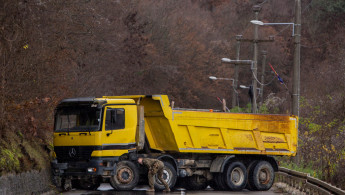Serbs in Kosovo block main roads as ethnic violence escalates after overnight clashes
Serb protesters in northern Kosovo blocked main roads for a second day on Sunday following a nighttime exchange of fire with police after the arrest of a former Serb policeman, amid rising tensions between authorities and Kosovo's Serb minority.
In recent weeks Serbs in northern Kosovo - which they believe to be part of Serbia - have responded with violent resistance to moves by Pristina that they see as anti-Serb.
EULEX, the European Union mission tasked with patrolling northern Kosovo, said a stun grenade was thrown on one of its armoured vehicles on Saturday evening, but no one was injured.
Josep Borrell, EU foreign policy chief, warned the bloc will not tolerate violence against members of its mission.
"#EU will not tolerate attacks on @EULEXKosovo or use of violent, criminal acts in the north. Barricades must be removed immediately by groups of Kosovo Serbs. Calm must be restored," he wrote on Twitter.
#EU will not tolerate attacks on @EULEXKosovo or use of violent, criminal acts in the north. Barricades must be removed immediately by groups of Kosovo Serbs. Calm must be restored. EULEX will continue to coordinate w/Kosovo authorities & KFOR.
— Josep Borrell Fontelles (@JosepBorrellF) December 11, 2022
All actors must avoid escalation.
The latest protests were triggered by the arrest of a former police officer on Saturday. He was part of a mass resignation of Serbs from the force last month, after Pristina said it would require Serbs to scrap Serbian license plates dating to before the 1998-99 Kosovo War that led to independence.
For a second day on Sunday, trucks and other heavy-duty vehicles blocked several main roads leading to two border crossings with Serbia. Both crossings were closed to traffic.
"The United States expresses its deep concern about the current situation in the north of Kosovo," the United States embassies in Belgrade and Pristina said in a statement.
"We call on everyone to exercise maximum restraint, to take immediate action to achieve a de-escalation of the situation, and to refrain from provocative acts."
Kosovo Prime Minister Albin Kurti has asked NATO's mission KFOR to remove the barricades.
"We call KFOR to guarantee the freedom of movement (and remove roadblocks)...KFOR is asking for more time to finish this ... so we are waiting," Kurti said.
Late on Saturday Kosovo police said they came under fire in different locations close to a lake bordering Serbia. The force said it had to return fire in self-defence. There were no reports of injuries.
Kosovo declared independence from Serbia in 2008 with the backing of the West, following the 1998-99 war in which NATO intervened to protect Albanian-majority Kosovo.
Serb mayors in northern Kosovo municipalities, along with local judges and some 600 police officers, resigned last month in protest over a government decision to replace Belgrade-issued car licence plates with ones issued by Pristina.
Police in Pristina said former policeman Dejan Pantic was arrested for allegedly attacking state offices, the election commission offices, and police officers and election officials.
Serbia's President Aleksandar Vucic presided over a National Security Council meeting on Sunday. "I call on Serbs to be calm. Attacks against KFOR and EULEX must not happen," Vucic told RTS national TV.
On Saturday, Vucic said Belgrade would ask KFOR to let Serbia deploy troops and police in Kosovo, but acknowledged there was no chance of permission being granted.
"We do not seek conflict, but dialogue and peace. But let me be clear: the Republic of Kosovo will defend itself - forcefully and decisively," Kurti said in response to Vucic's comments.
Kosovo and Serbia are holding talks in Brussels to try to normalise relations and the EU has already presented a plan.





 Follow the Middle East's top stories in English at The New Arab on Google News
Follow the Middle East's top stories in English at The New Arab on Google News
![The UAE is widely suspected of arming the RSF militia [Getty]](/sites/default/files/styles/image_330x185/public/2024-11/GettyImages-472529908.jpg?h=69f2b9d0&itok=Yauw3YTG)
![Netanyahu furiously denounced the ICC [Getty]](/sites/default/files/styles/image_330x185/public/2024-11/GettyImages-2169352575.jpg?h=199d8c1f&itok=-vRiruf5)
![Both Hamas and the Palestinian Authority welcomed the ICC arrest warrants [Getty]](/sites/default/files/styles/image_330x185/public/2024-11/GettyImages-2178351173.jpg?h=199d8c1f&itok=TV858iVg)